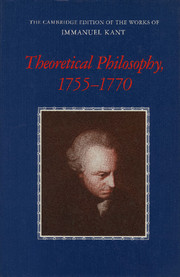Book contents
- Frontmatter
- Contents
- General editors' preface
- Preface
- Guide to abbreviations
- General introduction
- Introductions to the translations
- Résumés of the works
- A NEW ELUCIDATION OF THE FIRST PRINCIPLES OF METAPHYSICAL COGNITION (1755)
- THE EMPLOYMENT IN NATURAL PHILOSOPHY OF METAPHYSICS COMBINED WITH GEOMETRY, OF WHICH SAMPLE I CONTAINS THE PHYSICAL MONADOLOGY (1756)
- AN ATTEMPT AT SOME REFLECTIONS ON OPTIMISM (1759)
- THE FALSE SUBTLETY OF THE FOUR SYLLOGISTIC FIGURES (1762)
- THE ONLY POSSIBLE ARGUMENT IN SUPPORT OF A DEMONSTRATION OF THE EXISTENCE OF GOD (1763)
- ATTEMPT TO INTRODUCE THE CONCEPT OF NEGATIVE MAGNITUDES INTO PHILOSOPHY (1763)
- INQUIRY CONCERNING THE DISTINCTNESS OF THE PRINCIPLES OF NATURAL THEOLOGY AND MORALITY (1764)
- M. IMMANUEL KANT'S ANNOUNCEMENT OF THE PROGRAMME OF HIS LECTURES FOR THE WINTER SEMESTER 1765 — 1766 (1765)
- DREAMS OF A SPIRIT-SEER ELUCIDATED BY DREAMS OF METAPHYSICS (1766)
- Preamble, which promises very little for the execution of the project
- The first part, which is dogmatic
- The second part, which is historical
- First chapter A story, the truth of which is recommended to the reader's own free examination
- Second chapter Ecstatic journey of an enthusiast through the spirit-world
- Third chapter Practical conclusion drawn from the treatise as a whole
- CONCERNING THE ULTIMATE GROUND OF THE DIFFERENTIATION OF DIRECTIONS IN SPACE (1768)
- ON THE FORM AND PRINCIPLES OF THE SENSIBLE AND THE INTELLIGIBLE WORLD [INAUGURAL DISSERTATION] (1770)
- Factual notes
- Bibliographies of editions and translations
- Glossary
- Biographical-bibliographical sketches of persons mentioned by Kant
- Index
Second chapter - Ecstatic journey of an enthusiast through the spirit-world
Published online by Cambridge University Press: 18 December 2014
- Frontmatter
- Contents
- General editors' preface
- Preface
- Guide to abbreviations
- General introduction
- Introductions to the translations
- Résumés of the works
- A NEW ELUCIDATION OF THE FIRST PRINCIPLES OF METAPHYSICAL COGNITION (1755)
- THE EMPLOYMENT IN NATURAL PHILOSOPHY OF METAPHYSICS COMBINED WITH GEOMETRY, OF WHICH SAMPLE I CONTAINS THE PHYSICAL MONADOLOGY (1756)
- AN ATTEMPT AT SOME REFLECTIONS ON OPTIMISM (1759)
- THE FALSE SUBTLETY OF THE FOUR SYLLOGISTIC FIGURES (1762)
- THE ONLY POSSIBLE ARGUMENT IN SUPPORT OF A DEMONSTRATION OF THE EXISTENCE OF GOD (1763)
- ATTEMPT TO INTRODUCE THE CONCEPT OF NEGATIVE MAGNITUDES INTO PHILOSOPHY (1763)
- INQUIRY CONCERNING THE DISTINCTNESS OF THE PRINCIPLES OF NATURAL THEOLOGY AND MORALITY (1764)
- M. IMMANUEL KANT'S ANNOUNCEMENT OF THE PROGRAMME OF HIS LECTURES FOR THE WINTER SEMESTER 1765 — 1766 (1765)
- DREAMS OF A SPIRIT-SEER ELUCIDATED BY DREAMS OF METAPHYSICS (1766)
- Preamble, which promises very little for the execution of the project
- The first part, which is dogmatic
- The second part, which is historical
- First chapter A story, the truth of which is recommended to the reader's own free examination
- Second chapter Ecstatic journey of an enthusiast through the spirit-world
- Third chapter Practical conclusion drawn from the treatise as a whole
- CONCERNING THE ULTIMATE GROUND OF THE DIFFERENTIATION OF DIRECTIONS IN SPACE (1768)
- ON THE FORM AND PRINCIPLES OF THE SENSIBLE AND THE INTELLIGIBLE WORLD [INAUGURAL DISSERTATION] (1770)
- Factual notes
- Bibliographies of editions and translations
- Glossary
- Biographical-bibliographical sketches of persons mentioned by Kant
- Index
Summary
Somnia, terrores magicos, miracula, sagas, Nocturnos lemures, portentaque Thessala
– HoraceI cannot blame the cautious reader at all, if, in the course of this book, he has begun to feel reservations about the method which the author has thought proper to follow. For by placing the dogmatic part of the work before the historical part, and thus reasons before experience, I must have created the suspicion that I was proceeding in a cunning fashion. For, although I might perhaps already have had the story in my mind, I nonetheless proceeded as if I knew nothing apart from the pure, abstract observations, my purpose being to end by surprising the completely unsuspecting reader with a welcome confirmation derived from experience. And, indeed, this is a stratagem which philosophers have very successfully deployed on a number of occasions. For it is not to be forgotten, that all knowledge has two ends by which it can be caught; an a priori end, and one which is a posteriori. Various modern students of nature, it is true, have declared that one must start with the a posteriori end; they think that the eel of science can be caught by the tail, their view being that, if enough empirical cognitions are acquired, they can then gradually ascend to higher general concepts. Whether or not this is a prudent procedure, it is far from being sufficiently learned or philosophical, for this manner of proceeding soon leads to a Why? to which no answer can be given. And this is about as creditable to a philosopher as it would be to a merchant who, when requested by a client to settle a bill of exchange, politely requested the creditor to call again some other time. Thus, to avoid this difficulty, men of penetrating understanding have started from the opposite extremity, namely, from the pinnacle of metaphysics. But this approach involves a new difficulty: one starts, I know not whence, and arrives, I know not where; the advance of the arguments refuses to correspond to experience.
- Type
- Chapter
- Information
- Theoretical Philosophy, 1755–1770 , pp. 344 - 355Publisher: Cambridge University PressPrint publication year: 1992

